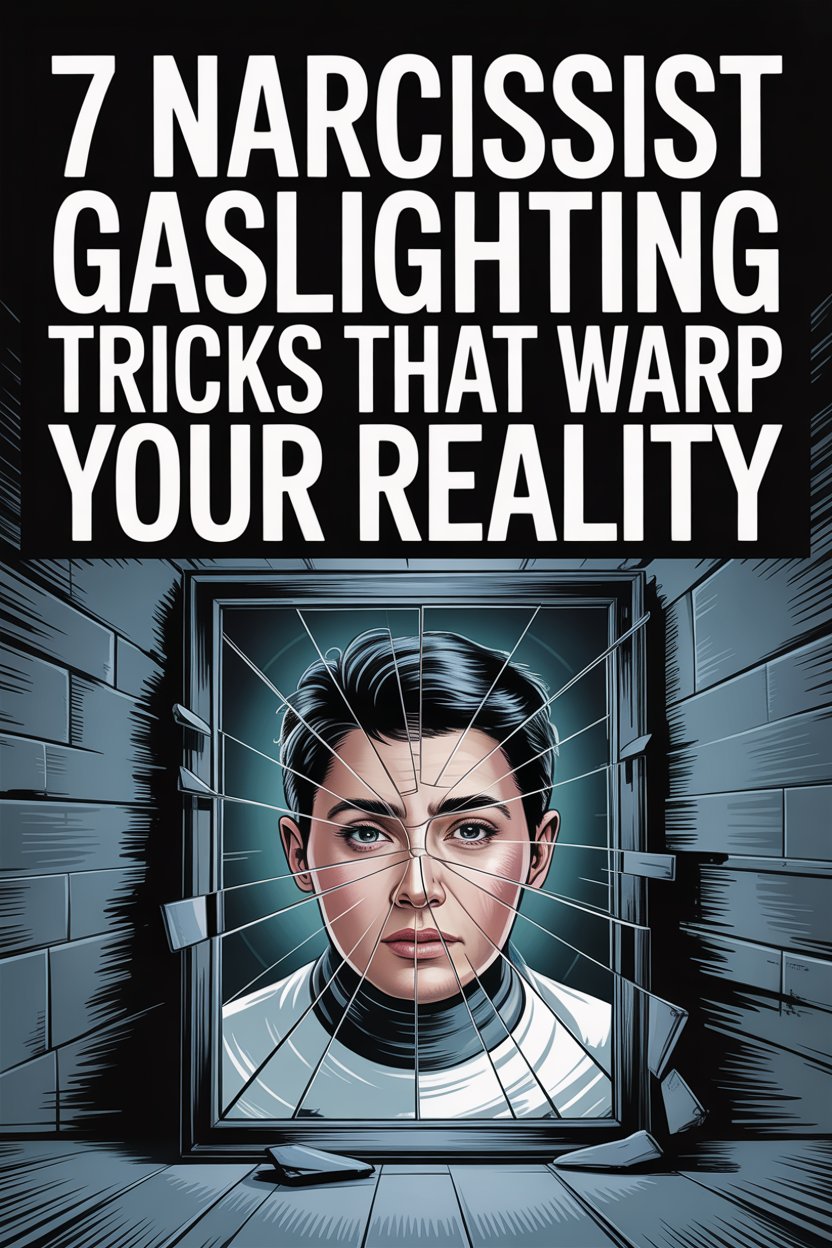Ever find yourself in an argument with someone and, by the end of it, you’re apologizing for things you didn’t even know you did?
Welcome to the funhouse mirror world of narcissistic gaslighting, where up is down, wrong is right, and your memory apparently has more plot holes than a daytime soap.
Narcissists are gifted illusionists—except Houdini never made his assistants doubt their own existence.
Gaslighting is their bread and butter, their favourite party trick, and their most effective method for bending reality until you can’t trust your own senses.
How do they pull it off? Let’s lift the curtain on the seven most common tricks—and how to stop them from turning your brain into a pretzel.
1. Denying What Happened
Nothing says “healthy communication” like being told, “That never happened,” when you literally watched it happen with your own two eyes.
This classic move is the narcissist’s version of “If I close my eyes, you can’t see me,” but with your last nerve as collateral damage.
You bring up a conversation from last week. Suddenly, you’re starring in a one-person play called “Inventor of Fake Memories.” They didn’t say that. They never did that. Maybe you’re just tired? Or sensitive? Or overreacting? (Spoiler: you’re not.)
How to counter? Keep a journal. Write down key conversations, dates, and events. It’s not about “proving” them wrong—it’s about keeping yourself anchored in your own reality, where purple is still purple and gaslighting is still a very, very real thing.
2. Dismissing Your Feelings
Nothing gets swept under the rug faster than your emotions when a narcissist’s around. You try to explain why something upset you, and suddenly you’re told you’re too emotional, too sensitive, or just plain irrational.
If you’re really lucky, you get all three at once.
This isn’t just emotional laziness—it’s a power play. If your feelings don’t count, neither do your boundaries. And if your boundaries don’t exist, well, narcissists have a lot more room for their own needs.
Remind yourself: your emotions are valid. Whether you’re angry or sad or just plain confused, you get to feel what you feel. Talk to friends or a therapist—people who don’t get hives at the mention of “feelings.”
3. Twisting the Story
Ever try to discuss a genuine concern and end up defending yourself for something you didn’t do? Welcome to the “how did we get here?” Olympic sport of narcissists everywhere.
They’ll take the conversation, spin it around, and launch it into another galaxy, all before you can say, “Hang on a sec.” Suddenly, you’re the villain and they’re the poor, misunderstood hero. It’s like arguing with a lawyer who’s also a magician.
Keep notes on key issues if you can. Bring the focus back: “We’re talking about what happened on Friday, not last year’s barbecue.” Don’t let them squirrel-chase you into a maze of irrelevance.
4. Playing the Victim
When a narcissist gets caught red-handed, don’t expect accountability. Expect an Oscar-worthy performance—teary eyes, trembling voices, stories of how hard their life has been. Your hurt feelings become a sideshow, upstaged by their tragic monologue.
Somehow, every conversation about your pain circles back to their suffering. You raise an issue; suddenly you’re comforting them. Next thing you know, you’re apologizing for being upset in the first place.
It’s emotional judo, and you didn’t even know you signed up for martial arts.
Resist the urge to play therapist. Acknowledge what they say, but don’t abandon your own perspective. “I hear this is tough for you—but my feelings are important, too.”
5. Isolating You from Your Support Network
Narcissists know the fastest way to turn your world upside down is to make sure you’re the only one in it. They’ll question your friends’ loyalty, plant seeds of doubt about your loved ones, and suggest that nobody understands you like they do. (How romantic. Or totally not.)
Little by little, your contact with supportive people shrinks. You stop reaching out because you don’t want drama. Suddenly, you’re relying on the narcissist for validation—and that’s a currency they control.
Make connecting with friends and family non-negotiable. Even if it’s just a text or a cuppa, stay plugged in to people who know you, love you, and don’t try to convince you that two plus two equals five.
6. Using “Jokes” and Sarcasm to Undermine You
Who doesn’t love a bit of banter? Except when every “joke” is a thinly veiled dig at your intelligence, looks, or sanity. Gaslighting narcissists are experts in the “just kidding” department.
If you protest, you’re accused of not being able to take a joke. If you laugh it off, the barbs continue. Win-win—for them.
Chronic sarcasm chips away at your self-worth, all while giving them plausible deniability. “I didn’t mean it, you’re so sensitive.” Sure, and I’m the queen of England.
Set a firm boundary: “I don’t find those jokes funny.” If they keep pushing, that’s a them problem, not a you problem.
7. Threatening Your Stability
Now for the pièce de résistance: “If you don’t… I’ll leave,” “Nobody else would put up with you,” or “You’ll regret this.” These aren’t just words; they’re emotional hand grenades.
Narcissists know exactly how to make you doubt everything, especially yourself.
The threat might be obvious or subtle—a withdrawn affection here, a cold shoulder there. The intended message is clear: safety, love, and stability all hang by a thread, and the narcissist holds the scissors.
Remind yourself, you existed before this relationship, and you’ll exist after. No one should feel like their world will collapse if one person walks away.
Getting Back Your Grip on Reality
Gaslighting works because it sneaks up on you.
One day, you’re confident and grounded; the next, you’re second-guessing your every move and wondering if you’ve lost the plot. Spoiler: you haven’t.
Trust your gut. If something feels off, it probably is. Connect with people who remember who you were before you got stuck in this emotional funhouse.
Therapy can be a game-changer, especially with someone who understands narcissistic abuse.
Boundaries are your best mate. Set them. Defend them. If someone refuses to respect your reality, ask yourself if they deserve front-row seats in your life.
And if all else fails, remind yourself: gaslighting is only magic if you agree to believe the illusion.
Keep your eyes open, your journal handy, and your sense of humour intact. Reality is still yours—hang on to it.


